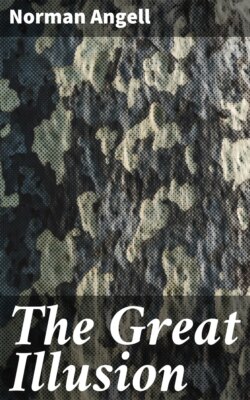Читать книгу The Great Illusion - Norman Angell - Страница 15
На сайте Литреса книга снята с продажи.
ОглавлениеGermany, it would seem, has already decided to annex the Grand Duchy of Luxemburg, and Belgium, incidentally with, of course, Antwerp, and will add all the northern provinces of France to her possessions, so as to secure Boulogne and Calais.
All this is to come like a thunderbolt, and Russia, Spain, and the rest of the Powers friendly to England will not dare to move a finger to aid her. The possession of the coasts of France and Belgium will dispose of England's supremacy for ever.
In a book on South Africa entitled "Reisen Erlebnisse und Beobachtungen," by Dr. F. Bachmar, occurs the passage:
"My second object in writing this book is that it may happen to our children's children to possess that beautiful and unhappy land of whose final absorption (gewinnung) by our Anglo-Saxon cousins I have not the least belief. It may be our lot to unite this land with the German Fatherland, to be equally a blessing to Germany and South Africa."
The necessity for armament is put in other than fictional form by so serious a writer as Dr. Gaevernitz, Pro-Rector of the University of Freiburg. Dr. Schulze-Gaevernitz is not unknown in England, nor is he imbued with inimical feelings towards her. But he takes the view that the commercial prosperity of Germany depends upon her political domination.[5]
After having described in an impressive way the astonishing growth of Germany's trade and commerce, and shown how dangerous a competitor Germany has become for England, he returns to the old question, and asks what might happen if England, unable to keep down the inconvenient upstart by economic means, should, at the eleventh hour, try to knock him down. Quotations from the National Review, the Observer, the Outlook, the Saturday Review, etc., facilitate the professor's thesis that this presumption is more than a mere abstract speculation. Granted that they voice only the sentiments of a small minority, they are, according to our author, dangerous for Germany in this—that they point to a feasible and consequently enticing solution. The old peaceful Free Trade, he says, shows signs of senility. A new and rising Imperialism is everywhere inclined to throw the weapons of political warfare into the arena of economic rivalry.
How deeply the danger is felt even by those who sincerely desire peace and can in no sense be considered Jingoes may be judged by the following from the pen of Mr. Frederic Harrison. I make no apology for giving the quotations at some length. In a letter to the London Times he says:
Whenever our Empire and maritime ascendancy are challenged it will be by such an invasion in force as was once designed by Philip and Parma, and again by Napoleon. It is this certainty which compels me to modify the anti-militarist policy which I have consistently maintained for forty years past. … To me now it is no question of loss of prestige—no question of the shrinkage of the Empire; it is our existence as a foremost European Power, and even as a thriving nation. … If ever our naval defence were broken through, our Navy overwhelmed or even dispersed for a season, and a military occupation of our arsenals, docks, and capital were effected, the ruin would be such as modern history cannot parallel. It would not be the Empire, but Britain, that would be destroyed. … The occupation by a foreign invader of our arsenals, docks, cities, and capital would be to the Empire what the bursting of the boilers would be to a Dreadnought. Capital would disappear with the destruction of credit. … A catastrophe so appalling cannot be left to chance, even if the probabilities against its occurring were 50 to 1. But the odds are not 50 to 1. No high authority ventures to assert that a successful invasion of our country is absolutely impossible if it were assisted by extraordinary conditions. And a successful invasion would mean to us the total collapse of our Empire, our trade, and, with trade, the means of feeding forty millions in these islands. If it is asked, "Why does invasion threaten more terrible consequences to us than it does to our neighbors?" the answer is that the British Empire is an anomalous structure, without any real parallel in modern history, except in the history of Portugal, Venice, and Holland, and in ancient history Athens and Carthage. Our Empire presents special conditions both for attack and for destruction. And its destruction by an enemy seated on the Thames would have consequences so awful to contemplate that it cannot be left to be safeguarded by one sole line of defence, however good, and for the present hour however adequate. … For more than forty years I have raised my voice against every form of aggression, of Imperial expansion, and Continental militarism. Few men have more earnestly protested against postponing social reforms and the well-being of the people to Imperial conquests and Asiatic and African adventures. I do not go back on a word that I have uttered thereon. But how hollow is all talk about industrial reorganization until we have secured our country against a catastrophe that would involve untold destitution and misery on the people in the mass—which would paralyze industry and raise food to famine prices, whilst closing our factories and our yards!
